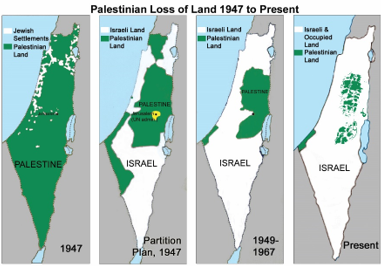SYLLABUS
GS-2: Important International institutions, agencies and fora – their structure, mandate.
Context:
Recently, the French President has announced that France will officially recognise a Palestinian state in September, making it the first G7 nation to take this historic step.
More on the News
• France and Saudi Arabia co-chaired a high-level summit at the United Nations in New York to generate momentum for the international recognition of a Palestinian state.
• Foreign ministers of France and 14 other countries represented at a special UN conference issued a “New York call” urging nations across the world to recognise a Palestinian state.
- The statement was signed by the foreign ministers of Andorra, Australia, Canada, Finland, France, Iceland, Ireland, Luxembourg, Malta, New Zealand, Norway, Portugal, San Marino, Slovenia and Spain.
• Meanwhile, the United Kingdom and Canada have stated that they will recognise Palestine as a state unless Israel fulfils certain conditions.
• The United States condemned the UN conference on the Israeli-Palestinian two-state solution, calling it unproductive.
• Israel has consistently opposed Palestinian statehood, arguing that such recognition would reward terrorism, particularly in light of the 2023 Hamas attack that ignited the ongoing war.
About the Two-State Solution
• The Two-State Solution refers to the proposed resolution to the Israeli-Palestinian conflict through the creation of two independent states—Israel and Palestine—coexisting side by side in peace and security.
• It envisions a sovereign Palestinian state in the West Bank and Gaza Strip, with East Jerusalem as its capital, alongside the existing state of Israel.
Historical Evolution of Palestine
• The evolution of Palestine’s modern history is deeply intertwined with colonial legacies, war, displacement and decades of conflict and negotiations.
• Balfour Declaration (1917): The British government issued a public statement supporting the establishment of a “national home for the Jewish people” in Palestine, then an Ottoman-controlled region with a small Jewish minority. This laid the foundation for future tensions.
• UN Partition Plan (1947): The United Nations proposed dividing British-ruled Palestine into separate Jewish and Arab states, with Jerusalem under international control. While Jewish leaders accepted the plan, Arab leaders rejected it outright.
• Creation of Israel and First Arab-Israeli War (1948): Following Israel’s declaration of independence, five Arab states launched a war against it.
- Israel emerged victorious, expanding its territory to 77% of historic Palestine. Around 700,000 Palestinians were displaced, many becoming refugees in neighboring countries.
• Six-Day War (1967): between Israel and the Arab countries of Egypt, Syria and Jordan
- The Six-Day War resulted in a significant Israeli victory, with Israel capturing the Golan Heights (from Syria), the Gaza Strip (from Egypt), the Sinai Peninsula, the West Bank (from Jordan) and gaining sole control of Jerusalem.
• First Intifada (1987–1993): A mass Palestinian uprising erupted in the occupied territories, marked by civil disobedience, protests and clashes. It brought international attention to the Palestinian cause and pressure for negotiations.
• Oslo Accords (1993): Marking a major diplomatic breakthrough, Israel and the Palestine Liberation Organisation (PLO) agreed on a framework for a two-state solution. This led to mutual recognition and the formation of the Palestinian Authority (PA) to govern parts of the West Bank and Gaza.
• Stalled Peace and Second Intifada (2000–2014): Despite multiple attempts to finalize a two-state agreement, efforts were derailed by the Second Intifada, rising political extremism, Israeli settlement expansion and leadership crises on both sides.

Achievements of Palestine
• International Support: Over 140 UN member states now recognise Palestine.
• Partial Self-Rule: The Palestinian Authority governs limited areas of the West Bank.
• Recognition of the Concept: The Two-State Solution is the official policy of the UN, EU, Arab League, and many Western nations.
• Geneva Accord (2003): An unofficial but detailed model laying out principles for:
- Borders, land swaps, refugee issues and shared Jerusalem.
UPSC Mains Practice Question
Q. “France’s recognition of Palestinian statehood marks a shift in global geopolitics surrounding the Israeli-Palestinian conflict.”Discuss the significance of this move in the context of the Two-State Solution and its implications for India’s West Asia policy. (15M, 250W)

